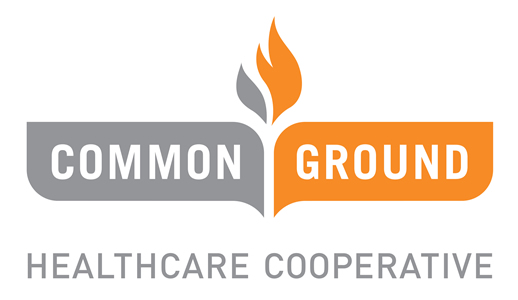At Common Ground Healthcare Cooperative, member health and safety comes first. For vaccine related questions, Wisconsin residents can call the COVID-19 vaccine assistance hotline at 844-684-1064.

COVID-19 Resources
COVID-19 Public Health Emergency Will Expire on May 11, 2023
We are thankfully in a better place today than we were three years ago. Based on current trends, COVID-19 is now a public health priority rather than an emergency. As a result, the federal government has decided to let the COVID-19 public health emergency (PHE) expire on May 11, 2023.
Please note, COVID‐19 vaccines and boosters will continue to be covered as no‐cost preventive care as of May 12, 2023.
What will change when the COVID-19 PHE ends?
- Cost sharing will apply to COVID-19 lab tests
Your plan’s cost-sharing rules will apply to COVID-19 laboratory tests starting on May 12, 2023. That means you may see copay, coinsurance, and/or deductible apply to COVID-19 lab tests.
- Out of network COVID-19 tests will no longer be covered
Starting on May 12, 2023, CGHC will only cover COVID-19 lab tests when the provider is in our network.
- Out of network COVID-19 vaccines will no longer be covered
As of May 12, 2023, CGHC will only cover COVID-19 vaccines when the provider is in our network or CGHC pharmacy network.
- At-home COVID-19 tests will no longer be covered
Starting on May 12, 2023, CGHC will no longer cover at-home COVID-19 tests that are typically purchased at a store or pharmacy.
Want more information about the changes that will take place due to the COVID-19 PHE expiring? Please visit the Health and Human Services (HHS) website.
Looking for your plan’s Summary of Benefits? Login to My Health portal or contact Member Services at 877-514-2442.
Why is Omicron such a big deal?
The Omicron B.1.1.529 variant has many mutations, some of which are quite concerning. Clinical evidence has shown that Omicron is more transmissible (highly contagious) and able to reinfect, compared to other variants of concern (VOCs). As of January 12, 2022, the CDC estimated the Omicron variant accounted for 98.3 percent of all COVID-19 cases in the United States. Sub-variants of Omicron continue to emerge, which has the potential to further its spread. Please see the CDC COVID-19 Website for the most recent information about variants of the virus.
Isn’t the spread of COVID-19 limited to big cities like Milwaukee and Green Bay?
Not necessarily. The Wisconsin Department of Health Services (DHS) reported on March 7, 2022, that COVID-19 transmission levels in Green Bay and Milwaukee are consistent with surrounding counties. Thanks to the high levels of vaccination and population immunity, the risk of severe hospitalizations and deaths due to COVID-19 is greatly reduced. Please go to the WI DHS COVID-19 Website for the most up-to-date information about the spread of COVID-19 in Wisconsin.
What is the impact of Omicron on children?
The Omicron variant is not always mild in children. We are seeing worsening respiratory illness in young children. This includes tracheobronchitis and bronchiolitis reminiscent of croup. Parents often think of “croupy cough” as a lower airway disease, but it’s not. With Omicron, the upper airways are impacted. This can be a problem for young children whose airways are smaller. Younger children who are unvaccinated are most at risk for developing COVID-induced upper airway inflammation. In rare cases, complete airway obstruction can occur. This may require urgent, definitive airway management. Some children require hospital admission, supplemental oxygen, and even ventilatory support. Learn about keeping kids healthy on the WI DHS COVID-19 Website.
Will the booster be required for me to be considered fully vaccinated?
Currently, people are considered fully vaccinated two weeks after:
- Two doses of the Pfizer® and Moderna® vaccines -or-
- One dose of Johnson & Johnson’s Janssen® vaccine.
.
However, the definition of fully vaccinated could change. “Optimal vaccination” (i.e., providing the greatest protection) does include booster immunizations in most age groups. Please see the CDC COVID-19 Website for more information about COVID-19 Vaccines and Boosters.
How much risk is there if I don’t get fully vaccinated?
Vaccinations provide the greatest protection against COVID-19 and its most serious symptoms. According to Wisconsin DHS data (from December 2021), people not fully vaccinated are:
- Diagnosed with COVID-19 at a rate 3x higher than fully vaccinated people
- Hospitalized with COVID-19 at a rate 10x higher than fully vaccinated people
- Dying from COVID-19 at a rate 14x higher than people who were fully vaccinated
Can pregnant or lactating females receive COVID-19 Vaccines?
Yes, to both. COVID-19 vaccination is recommended for all people who are pregnant or lactating. Approval by a healthcare professional is not required before receiving the vaccination, according to the CDC. However, if you are concerned about the use of a COVID-19 vaccine while pregnant or lactating, a discussion with your clinical provider team may help in deciding.
.
Increased risks for severe illness exist for pregnant and recently pregnant people (for at least 42 days following the end of pregnancy) with COVID-19, when compared with non-pregnant people. Pregnant people with COVID-19 are also at increased risk for preterm birth, stillbirth, and other pregnancy complications. For these reasons, COVID-19 vaccination is recommended for all people who are pregnant. Please visit the FDA Website and CDC COVID-19 Website for more information.
Can you get a COVID-19 primary vaccination or booster, and a flu shot at the same time?
Yes. Getting both the flu and COVID-19 vaccines at the same time is safe. Clinical studies and real-world experience have proven that you can receive both at the same time. Please visit the FDA Website for the most up-to-date information.
I have already had COVID-19 and am not vaccinated. Will my natural immunity protect me from getting COVID-19 again, just like with other viral illnesses?
Probably not. Studies have determined that immunity from having a COVID-19 infection drops rather quickly. Unvaccinated people may still get very sick and could actually die of a repeat COVID-19 infection. Even people who were quite ill with COVID-19 are at risk for being infected with one of the variants of concern. We saw this happen during the Delta surge in the fall of 2021. Reinfection primarily occurs because new variants are genetically different to prior variants due to mutations. For example, Omicron has over thirty (30) different mutations, which makes Omicron incredibly contagious and very risky for unvaccinated individuals.


